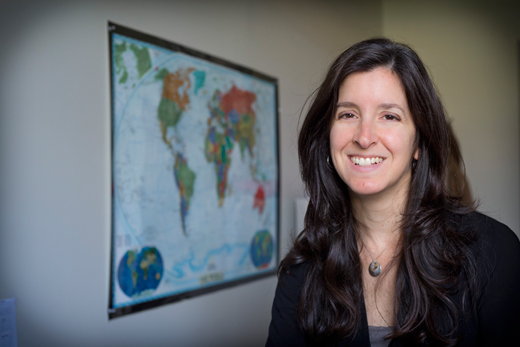In "Vaccine Nation," her soon-to-be-published book, Emory Assistant History professor Elena Conis scrutinizes America's ever-changing relationship with immunizations — an alliance that has shifted considerably over the past 50 years.
Despite the fact that children in the United States now receive more vaccines than any other generation, prompting sharp declines in several preventable diseases, Americans who once welcomed life-saving vaccines are now more critical consumers, voicing concerns over the safety of vaccines as never before.
Her new book, due out later this year, tackles the social history of childhood vaccinations from the 1960s onward, as seen through multiple lenses of inquiry — an ideal landscape for a researcher whose work is rooted in how culture and values have shaped the development of medicine, health science and health policy in the U.S. since the turn of the 20th century.
In some ways, Elena Conis is a poster child for the long-range benefits of a broad-based, interdisciplinary education. At various times her academic focus has included biology, art history, journalism, global health and environment and the history of health sciences — the very kind of boundary defying work that the Humanistic Inquiry Program (HIP) funded by the Mellon Foundation was designed to encourage.
Building her own academic pathway
Growing up in Long Island, N.Y., near the Cold Spring Harbor Laboratory would help whet an early appetite for biology; it became her undergraduate major at Columbia University. But a solid liberal arts core along the way also ignited a passion for art history as an academic minor.
In fact, conducting art history research in South America would ultimately help Conis hone her own public health interests. "Faced with all the hard-to-miss health problems in Peru, I decided I had a degree in biology and should make use of it," she recalls.
Her masters work in public health and journalism at the University of California, Berkeley, coincided with the arrival of author and educator Michael Pollan, who writes about food and the places where nature and culture intersect. Among a handful of journalism students focused on science and health, Conis joined Pollan as a research assistant, focusing on the intersection between science and health.
"At the time (2000), energy around key global health issues was building," she recalls. "The (United Nations) Millennium Development Goals had just been launched and major global initiatives set out ambitious goals to tackle AIDS, malaria and tuberculosis. As a journalist, I was looking for a chance to share these stories and make them as compelling and interesting to a broad audience as I had found them to be."
Writing a regular health-centered column for the Los Angeles Times allowed her to do that, and in 2004,, she began teaching global health classes at UC Berkeley. "For a couple of years, I was writing and teaching and then I realized that there are full-time positions where people actually do this — they're called 'professors,' " she says, laughing.
Conis went on to earn a PhD in the history of health sciences at the University of California San Francisco, excited at how, through historical teaching and research, she could share "fascinating stories that provide insights into the present day."
Humanistic perspectives of health
Some of those stories are woven into the classes she now teaches at Emory, which include "Vaccines and Society," "Health and the Environment in U.S. History," and "Opium to Obamacare: The Pursuit of Health in the United States," among others. This summer, she'll also offer "Disease and the City: A History of Health in Paris."
A 2012 HIP Fellow, Conis came to Emory first as a visiting assistant professor in anthropology and senior fellow in the Rollins School of Public Health. She now serves as an assistant professor in the Department of History, "a perfect home," she adds: "It's been delightful to build a career at Emory, a place where my colleagues and students join me in reaching across disciplines."
"I'm a historian by training but my research and courses tend to speak to students interested in the sciences, medicine and health careers, because I share their interests and background," Conis says.
"One of the joys of my work is being able to teach history classes to a group of students who would never have signed up for a history class before, but they're showing up and gaining a critical new perspective on their field, be it medicine, biology, public health, or nursing," she adds.
Her next research project? The history of the pesticide DDT.
"I'm looking at the pesticide's history as a case study in the role that health has played in our environmental politics. I'm asking how our environmental politics respond to advances in the health sciences and how, at the same time, environmental issues have reshaped the health sciences," Conis says.
"Human heath has always been at the core of our debates about the risks and benefits of DDT," she explains. "My research aims to understand how history has led us to assess those risks and benefits differently over time."

